Top 10 National News Stories of 2020
Newsrooms around the world were stretched to the limit in 2020, as journalists, including those at the Blade, struggled to cover multiple once-in-a-lifetime crises at once: a pandemic, the worst financial crisis since the Great Depression, a reckoning over racial justice and police brutality, and the 2020 presidential election.
Here are the Blade staff picks for the top 10 national news stories of 2020.
10: Methodist Church faces split
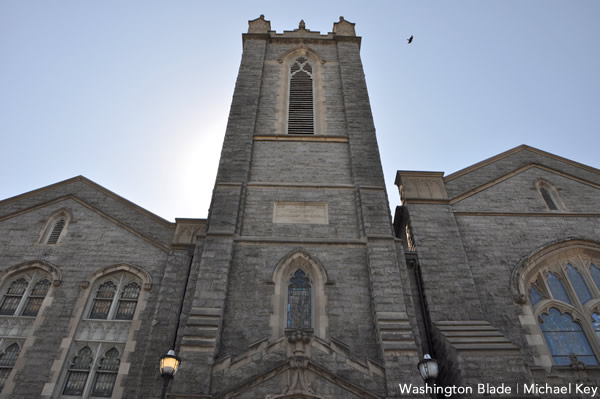
Amid division in the denomination over LGBTQ clergy and same-sex marriage, the Methodist Church proposed a formal plan this year to separate on the lack of agreement on religious views toward LGBTQ people.
The Methodist Church agreed to adopt a more LGBTQ-inclusive doctrine while allowing a coalition of conservative congregations in the United States and Africa who objected to change to separate. The “Protocol of Reconciliation and Grace through Separation” would allow the departing congregations to keep their property and give them $25 million to form a new denomination.
The plan would have needed approval in May 2020 in General Conference for ratification. The vote, however, never took place and was postponed until 2021 during the coronavirus pandemic.
9: Trump campaign stages Pride events
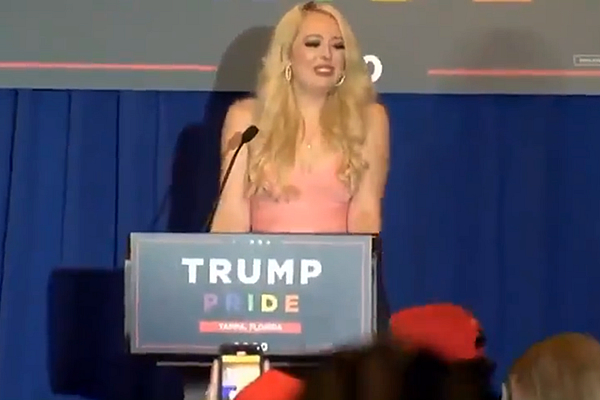
Upon stepping down from the Trump administration, Richard Grenell took on a new role as senior adviser for the Trump campaign on LGBTQ outreach and was made co-chair of the Trump Pride coalition, marking the first time a Republican presidential nominee had an LGBTQ political coalition.
Trump Pride held events in states deemed competitive in the election, including Arizona, Michigan, Pennsylvania, and Florida. Tiffany Trump, who had heretofore kept a low profile during her dad’s administration, participated in Trump Pride events in full support of her father, although she was mocked on Twitter during her public appearances.
Arguably, the Trump Pride coalition found success in convincing some LGBTQ voters to come to their side. Exit polls revealed 61 percent of LGBTQ voters backed Biden, the lowest percentage of support ever for a Democratic nominee, while 28 percent backed Trump, doubling his LGBTQ support from 2016.
8: Ric Grenell named acting DNI, 1st out gay Cabinet official
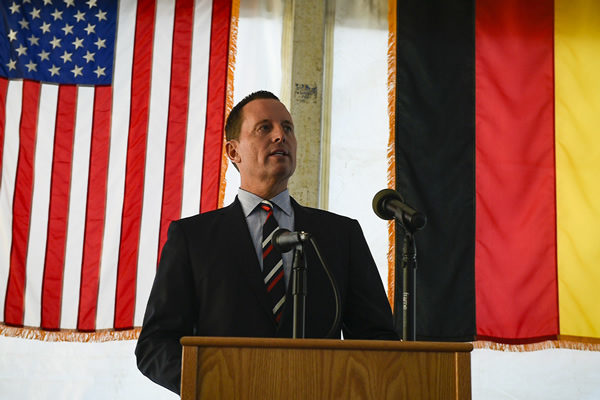
A Republican administration made the historic first of appointing the first openly gay person to a Cabinet post when President Trump named Richard Grenell, who had been serving as U.S. ambassador to Germany, as acting director of national intelligence.
Critics pointed out Trump never sought or won Senate confirmation for the role. Grenell also used the position as a political tool to declassify documents, seeking to impugn Biden for unmasking individuals caught up in surveillance during the Michael Flynn investigation.
But Grenell also used the position to highlight the global initiative to decriminalize homosexuality he spearheaded, threatening to cut off U.S. partners overseas from shared intelligence if they didn’t respect LGBTQ human rights.
Upon his departure, Grenell posted a photo to Instagram asserting President Trump gave him his Cabinet chair because being the first openly gay person to serve at that level was a “big deal.”
7: LGBTQ candidates win big on election night
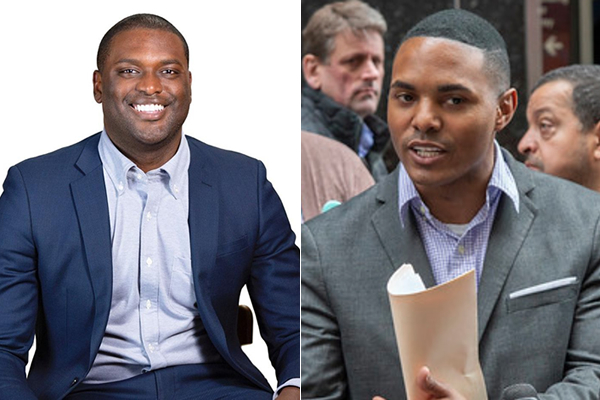
LGBTQ candidates in the 2020 election achieved historic firsts, breaking barriers and demonstrating political aspirants in marginalized communities have no limit in winning public office.
The LGBTQ Equality Caucus in the U.S. House will be expanded and diversified with the addition of Ritchie Torres and Mondaire Jones of New York, who will be the first Black, openly gay men elected to Congress. Torres is also the first openly gay Afro-Latino elected to Congress.
Sarah McBride, a transgender advocate famous for her speech at the Democratic National Convention in 2016, was elected to a seat in the Delaware State Senate, setting her up to become the highest-ranking openly transgender legislator in the United States. Other transgender candidates, Taylor Small in Vermont and Stephanie Byer in Kansas, won seats in state legislatures, nearly doubling the number of transgender legislators in the United States.
6: FDA eases gay blood ban
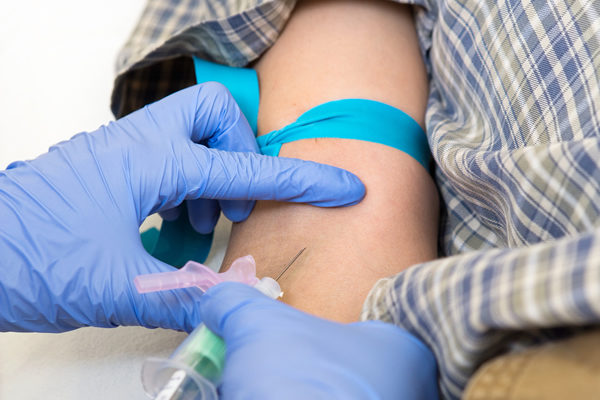
In a move uncharacteristically positive for the LGBTQ community from the Trump administration, the Food & Drug Administration this year eased the ban on blood donations from gay and bisexual men.
The previous policy, set up by the Obama administration, required men to abstain from having sex with men for 12 months before making a donation. The FDA, amid a blood shortage during the coronavirus pandemic, shortened the deferral period to three months. The 12-month wait instituted during the Obama administration was a drastic change from the lifetime ban on blood donations from gay and bisexual men instituted in 1983.
President Trump said he had no hand in the FDA decision. When asked by the Blade about the change during a White House news conference, Trump replied, “No. I didn’t know anything about that. That was done by the FDA, very capable people at the FDA.”
5: RBG dies weeks before election
Ruth Bader Ginsburg, known as a champion of LGBTQ rights as an associate justice on the U.S. Supreme Court, died after 27 years on the bench. Hundreds gathered at the Supreme Court on the night of her death to adorn the ground with memorabilia in mourning over her passing.
Ginsburg had joined each of the milestone rulings in favor of LGBTQ rights and same-sex marriage, including Romer v. Evans, Lawrence v. Texas, Windsor v. United States and Obergefell v. Hodges. Most recently, Ginsburg joined the Bostock decision finding anti-LGBTQ discrimination is illegal under federal civil rights law.
President Trump, however, chose to fill Ginsburg’s seat with Amy Coney Barrett, a jurist who’s a favorite among the Christian right. Shortly after confirmation, Barrett participated in arguments for the case of Fulton v. City of Philadelphia, which will determine whether a Catholic foster care agency has a First Amendment right to reject LGBTQ families over religious objections.
4: Landmark SCOTUS ruling on LGBTQ workplace rights
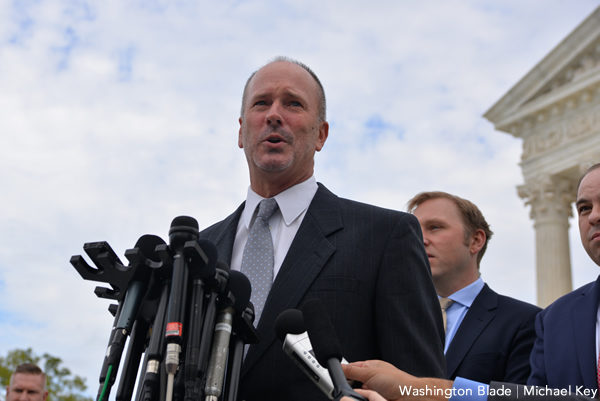
In a historic ruling ending a long fight to prohibit employment discrimination against LGBTQ people in federal law, the U.S. Supreme Court ruled in the consolidated case of Bostock v. Clayton County that anti-LGBTQ discrimination constitutes a form of sex discrimination.
Although the ruling pertained to employment discrimination under Title VII of the Civil Rights Act of 1964, the decision has broad applications to all laws banning sex discrimination, including civil rights law in housing, health care, education, and credit.
The litigation came about after Gerald Bostock was fired from his job as a municipal worker after expressing interest in a gay softball league and Aimee Stephens, a funeral home director in Michigan, who was fired for being transgender. Stephens died shortly before the decision was handed down.
The Trump administration, however, never fully implemented the decision, and outright flouted it with regard to access to sex-segregated spaces for transgender people. Biden is expected to recognize Bostock fully upon taking office.
3: Calls for racial justice after George Floyd killed
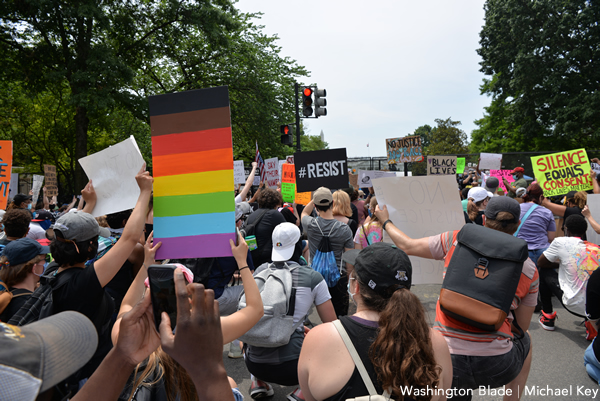
The death of George Floyd at the hands of Minneapolis police ignited a firestorm of protests and energized the Black Lives Matter movement, bringing calls for police reform, if not to outright defund the police, and end systemic racism.
LGBTQ Pride events, which had been cancelled amid the coronavirus epidemic, were in some cases back on with a renewed focus on anti-racism. (Drama followed, however, when LA Pride planned a solidarity march and sought cooperation with police. Organizers ended up handing over the reins to All Black Lives Matter, an advisory board of Black LGBTQ activists.)
Much of the outrage was directed at President Trump, who reportedly hid in a bunker amid protests that became violent outside the White House. Afterwards, Trump went to St. John’s Church near Lafayette Square with Cabinet officials to hold up a Bible in a controversial photo-op.
2: Biden wins; Kamala Harris makes history
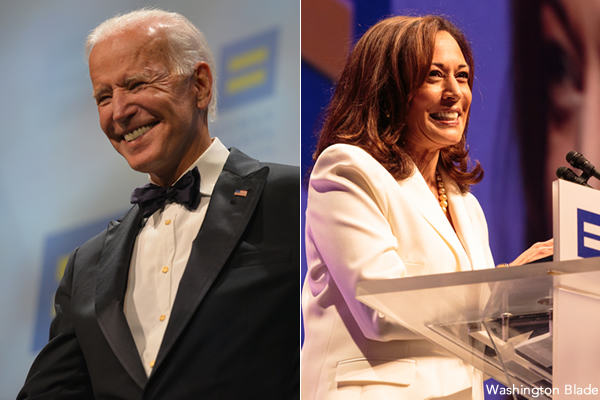
Joe Biden won the presidential election this year, ensuring Donald Trump would be a one-term president and bringing an end to an administration with a record of anti-LGBTQ policies.
Biden, whose comments in favor of same-sex marriage on “Meet the Press” in 2012 are still remembered for their impact, has long-standing connections to the LGBTQ community and issued a detailed policy plan for LGBTQ initiatives he’d pursue in his administration. Biden has pledged to end the transgender military ban and sign the Equality Act into law within 100 days.
Vice President-elect Kamala Harris, who made history as the first woman of color elected as part of a presidential ticket, also has deep ties to the LGBTQ community. As California attorney general, Harris declined to defend California’s ban on same-sex marriage on Proposition 8 in court and raised LGBTQ issues as U.S. senator.
In another historic move, Biden tapped Pete Buttigieg for Transportation Secretary. He would become the first openly gay Senate-confirmed Cabinet official if approved in 2021.
1: Coronavirus ravages U.S. public health, economy
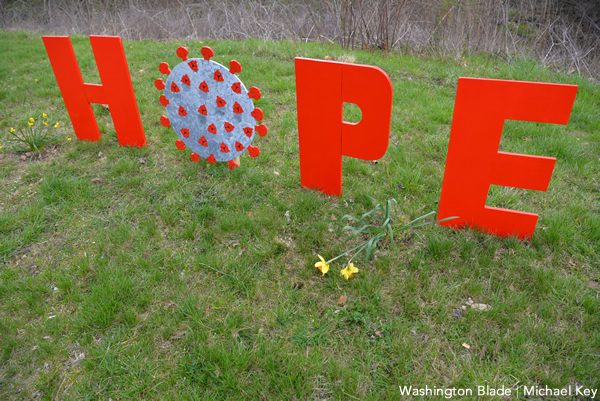
The coronavirus pandemic left hundreds of thousands dead, disrupted lives and threw the economy into a tailspin, stoking fears in a way no other public health crisis has done since the HIV/AIDS epidemic as the virus continued to spread. The outbreak is the Washington Blade’s top national news event of 2020.
COVID-19, which originated in China, had killed by mid-December an estimated 300,000 people in the United States and infected 16 million. Although states kept tabs on racial, ethnic, and gender demographics on the disease, few recorded data on LGBTQ casualties.
An estimated 100,000 businesses across the nation closed their doors as governors ordered residents to remain at home, much to the consternation of conservative activists who said the directives were unconstitutional. The annual Pride month celebrations and parades were among the events cancelled.
The downturn in the economy forced many small business to close and put many workers on unemployment. Hospitality workers, many of whom are LGBTQ people, were hit especially hard. The Paycheck Protection Program saved many jobs, but as of late December, Congress had not come to an agreement on additional stimulus.
President Trump, who continued to insist the coronavirus would simply “go away,” faced heavy criticism for failing to contain the epidemic, leading to major change in the 2020 election.
Honorable mention: Blade reporter refuses to move seat in WH briefing room
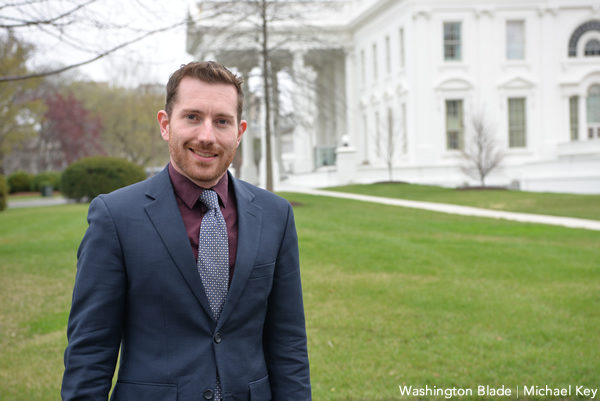
When Blade reporter Chris Johnson was fulfilling his role in the pool rotation for the White House press corps, the White House press office sought to humiliate CNN’s Kaitlan Collins by ordering Johnson to switch seats with her. Collins had an assigned seat in the front row of the briefing room, while the seating arrangements had the Blade toward the back.
Johnson refused to move, pointing out the White House Correspondents Association controls the seating assignments, not the White House. Johnson held firm even though he was told the Secret Service was involved in wanting the switch. Secret Service later denied any involvement. Johnson won widespread praise from mainstream media colleagues for his cool-headed, brave handling of the situation. (By Kevin Naff)